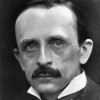To die will be an awfully big adventure.
James Barrie (1860-1937) Scottish novelist and dramatist
Peter Pan, Act III, final sentence (1905)
The following passage was in the 1911 book (ch. 8 "The Mermaid's Lagoon"); the scene was added to the 1905 edition of the play:
Peter was alone on the lagoon.
The rock was very small now; soon it would be submerged. Pale rays of light tiptoed across the waters; and by and by there was to be heard a sound at once the most musical and the most melancholy in the world: the mermaids calling to the moon.
Peter was not quite like other boys; but he was afraid at last. A tremor ran through him, like a shudder passing over the sea; but on the sea one shudder follows another till there are hundreds of them, and Peter felt just the one. Next moment he was standing erect on the rock again, with that smile on his face and a drum beating within him. It was saying, "To die will be an awfully big adventure."Sometimes quoted as "To die would be an awfully great adventure," "To die will be a great adventure," and "To die would be a great adventure."

